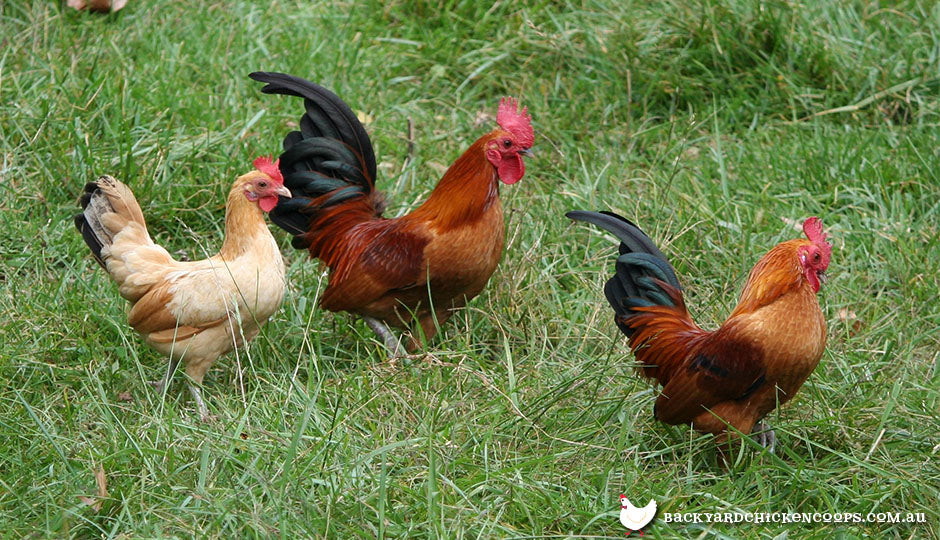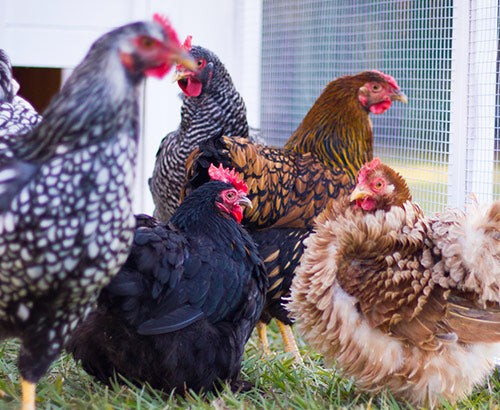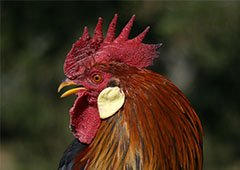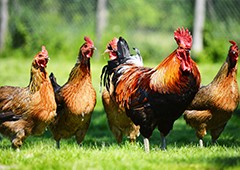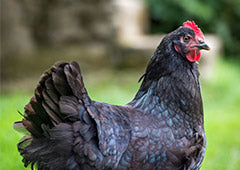Roosters are a contentious issue among backyard chicken keepers. On the one hand, these charming chaps can be a huge benefit in keeping your flock safe and happy. On the other hand, a musical wake-up call can be too much to bear on an otherwise-lazy Sunday morning. Crowing can be a serious nuisance, but with a little patience and preparation, you can set up a backyard paradise that’ll keep everyone happy (even the neighbours!).
- Know the law!
Different councils around Australia have different laws regarding roosters. Some of them explicitly prohibit roosters, but many of them don’t make any specific rules for the boys. Chickens are chickens! Here are some examples:
[Accurate as of 10 January 2017]
- Brisbane City Council - prohibits roosters.
- Australian Capital Territory - no explicit rules, but covered by noise restrictions
- Melbourne City Council - no explicit rules, but covered by noise restrictions
- Blacktown City Council - prohibits roosters
As you can see, different councils have different rules. You should check with your own council to see which ones apply to you. Regardless, even if you are technically allowed to keep roosters, no council will allow excessive noise. Excessive noise is a term that is usually defined by your neighbours - so take steps to keep it down, or risk losing that rowdy roo!
- Keep them happy!
Roosters don’t just crow in the morning: they’ll pipe up for a variety of reasons at any hour, including spotting predators, finding food, or quibbling with another chook. And they’ll also speak up to complain if you aren’t taking good care of them! So:
- Make sure they have plenty of food and water, even at night.
- Keep their coop clean, and tidy.
- Enclose them in their coop overnight, to keep distractions to a minimum.
- Predator-proof your yard to avoid nasty surprises.
- Keep no more than 1 rooster per 8 or 10 hens, to avoid squabbles.
- Manage the morning crow!
The most infamous rooster crow happens at sunrise. Well, not exactly. Roosters actually base their crowing on a biological clock that anticipates sunrise rather than greets it. So rather than a nice 5am sleep-in, the unprepared keeper will be bolt-awake at 3am. Morning after morning, you might get used to it, but your poor neighbours will be a little less patient.
Fortunately, there are steps you can take to reduce the noise, or at least set the chook-alarm for a more reasonable hour:
- Anti-crow collar: this is a wide strip of velcro fastened around the roo’s neck to restrict airflow to the voice box. Don’t worry! Chicken anatomy is different to humans’, and the collar won’t cause any harm. The rooster will still try to crow, but these crows will have a garbled sound that is much quieter than a full-throated cock-a-doodle-doo!
- Blackout box: this is a completely darkened enclosure in which the rooster sleeps by himself. While it will help minimise nightly disturbances, and thus unexpected crowing, it is unlikely to stop the morning crow, since this relies on an internal biological clock, and not on the sun itself. A better strategy is to hack the biological clock using artificial lighting in combination with a blackout box setup. After sundown, leave the artificial light inside the box on until later (say, 10pm). Over a few days, the artificial light should trick your rooster into crowing later in the morning. An 8am wakeup is well within reach!
- Coop design: an especially quirky solution is to have a lower ceiling in your coop. Roosters need to stretch their neck up and out in order to crow. If your coop has little headroom, they physically won’t be able to do it.
- Remind them that you’re here to help!
Roosters are always the dominant personality in the chicken coop. Treat your chooks well, and he’ll respect you. However some particularly territorial boys might come to see you as a competitor, instead of a friend and carer. If that happens, stand your ground! Let a rooster bully you, and he might get some ideas about who is in charge - if he lunges at you, hold him down firmly. You might get some scratches in the process, but you’ll have a better relationship long term.
Speaking of scratches, the most fearsome trait of a rooster are definitely his spurs. These are the long ‘claws’ sprouting from the back of his leg. They can be a serious nuisance to you, and can also cause harm to your hens when a randy roo decides to mount them. Trimming spurs is advisable, and if done correctly, perfectly harmless. However, if you’re inexperienced with handling animals, you may want to take your boy to the vet to see how it’s done. To trim his spurs, catch your boy, wrap him in a towel to stop him wriggling, and then either:
- File them down to a blunt end with a dremel tool. Be careful not to go too far or you’ll cause bleeding!
- Or, grasp the spur firmly between some pliers (do not squeeze too hard!). Rotate the spur casing back and forth. Do not pull! After 30-45 seconds the casing should fall off. There will be some bleeding, so have the styptic powder ready to go!
Either way, the spur will grow back eventually - you will need to repeat this process regularly.
And there you have it! Keeping a roo isn’t so hard! Find out what they can do for you here.
How long do roosters live?
Like most other chickens, roosters have an average lifespan of 5 to 8 years. However it also depends heavily on their lifestyle, environment, diet and breed. With the best care, you might find your rooster will live as long as 15 years!
Similar to hens, there are stresses that can reduce their lifespan. These include living in overcrowded conditions, fear of predators and loud noises.
Whats the difference between a cockerel and a rooster?
A cockerel is a young rooster or male chicken and a rooster is a mature or adult male chicken. They graduate to rooster level at about one year of age.
Wherever you have a Henry or Hernietta in your flock, we all want to do an eggcellent job when caring for our feathered friends. There are so many things to consider when becoming a chicken parent from other pets to health issues. Many chicken keepers struggle to handle chicken health or behaviour issues, especially in the first few years of having a flock.
This is why I recommend Chickenpedia to all my readers. They have comprehensive online courses on everything you didn’t know you need to know and then some more! From healthcare to raising baby chicks to feeding and behavior, you’ll find beginner-friendly courses that’ll give you the knowledge and confidence to successfully look after your chickens.
As a member, you will get access to ALL their fantastic courses. No need to wing it, become the ultimate chicken eggspert! Check out Chickenpedia today!




